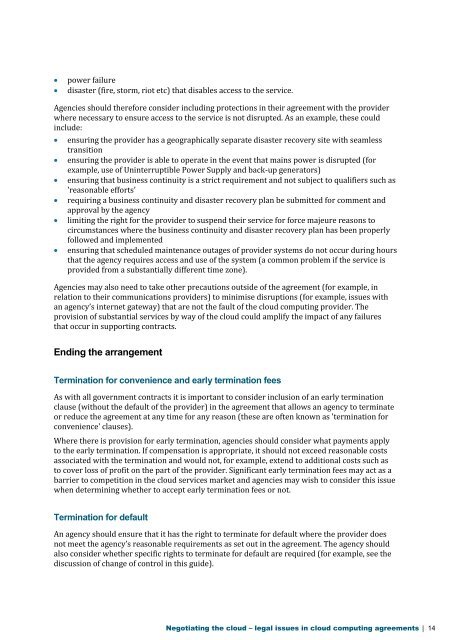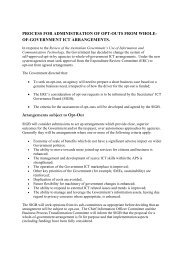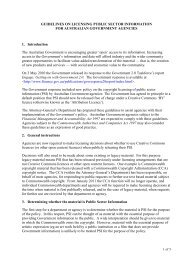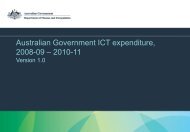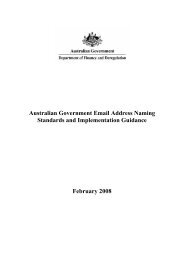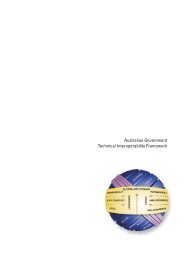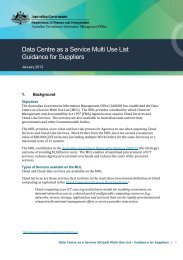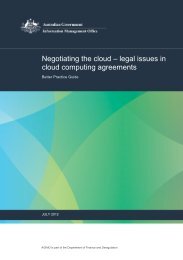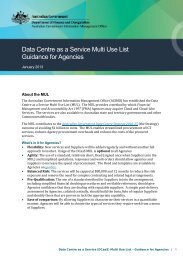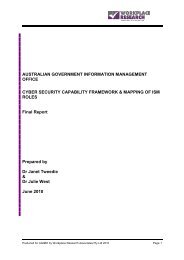legal issues in cloud computing agreements - Australian ...
legal issues in cloud computing agreements - Australian ...
legal issues in cloud computing agreements - Australian ...
You also want an ePaper? Increase the reach of your titles
YUMPU automatically turns print PDFs into web optimized ePapers that Google loves.
power failure<br />
disaster (fire, storm, riot etc) that disables access to the service.<br />
Agencies should therefore consider <strong>in</strong>clud<strong>in</strong>g protections <strong>in</strong> their agreement with the provider<br />
where necessary to ensure access to the service is not disrupted. As an example, these could<br />
<strong>in</strong>clude:<br />
<br />
<br />
<br />
<br />
<br />
<br />
ensur<strong>in</strong>g the provider has a geographically separate disaster recovery site with seamless<br />
transition<br />
ensur<strong>in</strong>g the provider is able to operate <strong>in</strong> the event that ma<strong>in</strong>s power is disrupted (for<br />
example, use of Un<strong>in</strong>terruptible Power Supply and back-up generators)<br />
ensur<strong>in</strong>g that bus<strong>in</strong>ess cont<strong>in</strong>uity is a strict requirement and not subject to qualifiers such as<br />
'reasonable efforts'<br />
requir<strong>in</strong>g a bus<strong>in</strong>ess cont<strong>in</strong>uity and disaster recovery plan be submitted for comment and<br />
approval by the agency<br />
limit<strong>in</strong>g the right for the provider to suspend their service for force majeure reasons to<br />
circumstances where the bus<strong>in</strong>ess cont<strong>in</strong>uity and disaster recovery plan has been properly<br />
followed and implemented<br />
ensur<strong>in</strong>g that scheduled ma<strong>in</strong>tenance outages of provider systems do not occur dur<strong>in</strong>g hours<br />
that the agency requires access and use of the system (a common problem if the service is<br />
provided from a substantially different time zone).<br />
Agencies may also need to take other precautions outside of the agreement (for example, <strong>in</strong><br />
relation to their communications providers) to m<strong>in</strong>imise disruptions (for example, <strong>issues</strong> with<br />
an agency’s <strong>in</strong>ternet gateway) that are not the fault of the <strong>cloud</strong> comput<strong>in</strong>g provider. The<br />
provision of substantial services by way of the <strong>cloud</strong> could amplify the impact of any failures<br />
that occur <strong>in</strong> support<strong>in</strong>g contracts.<br />
End<strong>in</strong>g the arrangement<br />
Term<strong>in</strong>ation for convenience and early term<strong>in</strong>ation fees<br />
As with all government contracts it is important to consider <strong>in</strong>clusion of an early term<strong>in</strong>ation<br />
clause (without the default of the provider) <strong>in</strong> the agreement that allows an agency to term<strong>in</strong>ate<br />
or reduce the agreement at any time for any reason (these are often known as 'term<strong>in</strong>ation for<br />
convenience' clauses).<br />
Where there is provision for early term<strong>in</strong>ation, agencies should consider what payments apply<br />
to the early term<strong>in</strong>ation. If compensation is appropriate, it should not exceed reasonable costs<br />
associated with the term<strong>in</strong>ation and would not, for example, extend to additional costs such as<br />
to cover loss of profit on the part of the provider. Significant early term<strong>in</strong>ation fees may act as a<br />
barrier to competition <strong>in</strong> the <strong>cloud</strong> services market and agencies may wish to consider this issue<br />
when determ<strong>in</strong><strong>in</strong>g whether to accept early term<strong>in</strong>ation fees or not.<br />
Term<strong>in</strong>ation for default<br />
An agency should ensure that it has the right to term<strong>in</strong>ate for default where the provider does<br />
not meet the agency’s reasonable requirements as set out <strong>in</strong> the agreement. The agency should<br />
also consider whether specific rights to term<strong>in</strong>ate for default are required (for example, see the<br />
discussion of change of control <strong>in</strong> this guide).<br />
Negotiat<strong>in</strong>g the <strong>cloud</strong> – <strong>legal</strong> <strong>issues</strong> <strong>in</strong> <strong>cloud</strong> comput<strong>in</strong>g <strong>agreements</strong> | 14


